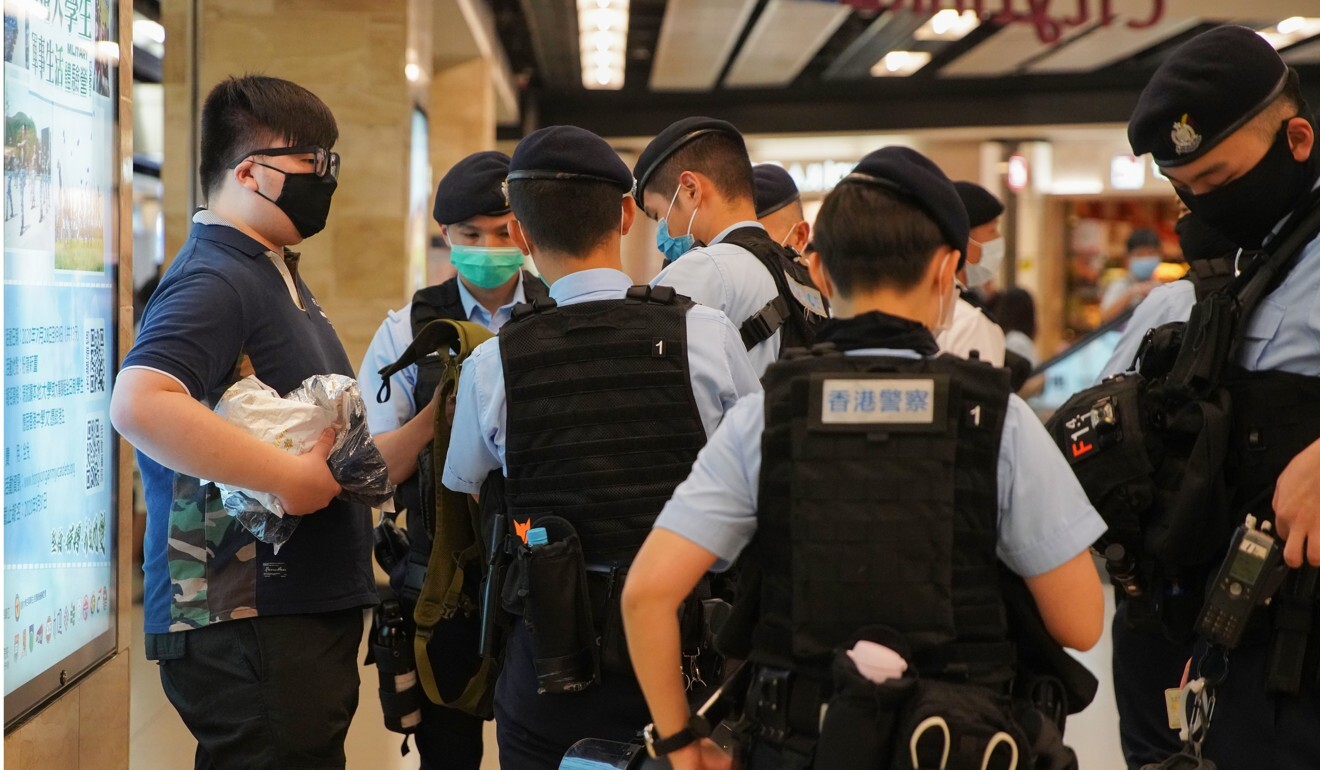
Hong Kong protests: plain-clothes police arrest eight in mall as demonstrators heed online calls to gather in four shopping centres
- Crowd inside East Point City mall had chanted anti-government and anti-police slogans before arrests were made
- Dozens also gathered at Yoho Mall in Yuen Long and New Town Plaza in Sha Tin
The protesters showed up at the East Point City mall in Tseung Kwan O after heeding online calls to gather at four arcades across town in a series of “shop with you” protests, aiming to force businesses to close temporarily.
Around 2.20pm, a group of plain-clothes officers subdued eight people inside East Point City. Before that, a crowd of protesters had chanted anti-government and anti-police slogans inside the mall.
Those arrested were cuffed with plastic ties, as police warned others inside the mall they were taking part in an unauthorised assembly.

An officer raised a blue flag at 2.35pm warning police might use force, as others readied batons and other weapons.
A crowd of onlookers remained inside the mall after police took away those arrested.
By 3pm, dozens of people also gathered at Yoho Mall in Yuen Long and New Town Plaza in Sha Tin.
In a post on Facebook, police said about 50 people had gathered inside East Point City to chant slogans. Eight people were arrested for offences related to illegal assembly, and assaulting and obstructing police officers.
Police warn of legal action against district councillor’s call for revenge
“Police urge people to stop gathering in public places to reduce the risk of transmitting [the coronavirus],” it said.
To halt the spread of the coronavirus, Hong Kong has social-distancing regulations in place that ban public gatherings of more than eight people.
Police were also seen live-streaming the situation at protest sites.
An officer was seen operating a video camera, while another provided commentary with a microphone.
Police made their largest mass arrest in recent months last Sunday and early Monday, detaining 230 people after similar protests in about 10 malls on Mother’s Day.
Some were also arrested in the Mong Kok shopping district after protesters tried to block roads and light trash on fire.
Officers on Sunday cited the government’s ban on public gatherings, but arrested most people on allegations of illegal assembly.
IPCC reports on six days that changed the course of the Hong Kong protests
Since April 26, when hundreds gathered in the Cityplaza mall in Taikoo Shing to chant slogans, Hong Kong has seen a revival of protests, which had died down because of the Covid-19 pandemic.
Protests first broke out in June last year, sparked by a now-withdrawn extradition bill. The demonstrations later evolved into a wider anti-government movement, with clashes between radical protesters and police turning increasingly violent. With the onset of the coronavirus crisis, the campaign began losing momentum.

Meanwhile, the British Foreign Office has renewed its call for an independent inquiry into the Hong Kong police’s handling of the protests.
“Addressing police accountability remains essential for rebuilding trust in Hong Kong,” a spokesman said. “As we have consistently stated, we urge the authorities to facilitate a robust, independent inquiry.”
The office also said it would carefully study the report by force watchdog Independent Police Complaints Council that was published on Friday.
The 999-page report found no systemic problem with the policing, and said officers’ use of force was only in response to violence.
It made over 50 recommendations, including more training for officers and clearer guidelines on using weapons.
The report was criticised by opposition lawmakers and human-rights watchers for failing to address allegations of police brutality.
Help us understand what you are interested in so that we can improve SCMP and provide a better experience for you. We would like to invite you to take this five-minute survey on how you engage with SCMP and the news.

